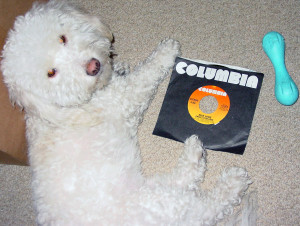Raised Jewish, I celebrated Hanukkah. For several years, my family also celebrated Christmas. We didn’t go to midnight mass, we didn’t drink egg nog, we didn’t throw a special type of log in the fireplace. (By the way, I have no idea what makes a Yule log yuley). We put tinsel and candy canes on a large potted plant my mother had in the den and bought each other small but practical gifts. For example, when I was 11 for Christmas my parents got me a salt shaker. The Christmas celebrations stopped after I innocently told Grandpa Mordechai about them. My parents were so angry with me they took away my salt shaker.
Though I no longer celebrate Christmas, I still have a major jones for Christmas music. I own many more Christmas records than any atheist Jew probably should. We’re talking in the hundreds.
I eschew Christmas classics performed by well-known middle-of-the-road acts such as Celine Dion, Michael Bublé, Kenny G (sell-out Jew), Neil Diamond (sell-out Jew) or Barbra Streisand (sell-out Jew). Frank Sinatra shows up only in a duet with Cyndi Lauper and Bing Crosby shows up only in his duet with David Bowie.
Including the Crosby/Bowie version, I have 15 renditions of “The Little Drummer Boy” in my iPod, by a diverse list of artists including Johnny Cash, The Temptations, Joan Jett, Bob Dylan, Iggy Pop and RuPaul.
I have ten versions of “Winter Wonderland,” and that’s not counting the cross-dressing parody “Walkin’ Round in Women’s Underwear,” not performed by RuPaul.
I have “Christmas in Hollis,” “Christmas in Harlem,” “Christmas in Washington,” “Christmastime in the LBC,” “Christmas in the City,” “Christmas in Heaven,” “Christmastime in Hell” and “Christmas at the Zoo.”
I have Christmas songs by most of my favorite artists of all-time, including The Beatles, Prince, Michael Jackson, Madonna, Stevie Wonder, R.E.M., Elvis Presley, The White Stripes, Kanye West, Ike and Tina Turner, Chuck Berry, and Radiohead.
Some Christmas songs aren’t Christmas songs at all. “Frosty the Snowman,” “Let It Snow Let it Snow Let It Snow” and “Winter Wonderland” don’t mention the baby Jesus or Santa Claus or presents or a bullied reindeer with a skin ailment.
Some of the Christmas songs I have are a bit odd. “I Found the Brains of Santa Claus,” a smooth jazz version of “Grandma Got Run Over By a Reindeer,” C3PO and R2D2 singing “Sleigh Ride.” I have Liberace reciting “Twas the Night Before Christmas,” though his version doesn’t hold a candle to Aretha Franklin’s version, in which the Queen of Soul took a few liberties with the words: “A bundle of gifts he had and what did I get? / As I squealed, opening the package, the same old shit!” Her lyrics are downright Disneyesque compared to Snoop Dogg’s reading of the famous poem. If you’re interested, Google the lyrics because I’m not going to print them here.
I have John Denver singing “Please Daddy (Don’t Get Drunk This Christmas).” Verse one opens with a couplet for the arithmetically-challenged: “Just last year when I was only seven / Now I’m almost eight you can see.” Santa needs to bring John some flashcards. The next two lines create a holiday image that is less Norman Rockwell and more John Waters: “You came home at quarter past eleven / And fell down underneath the Christmas tree.” Someone needs to get him to a 12-step group. He can attend a meeting with the title character of Fishbone’s “Slick Nick, You Devil You,” who came down the chimney with a keg of brew and spilled Jack Daniels all over the drapes.
I have Sarah Silverman singing “Give the Jew Girl Toys,” in which she taunts Santa by singing “You have a list / Well, Schindler did to / Liam Neeson played him / Tim Allen played you.”
Then there’s the classic “Fairtytale of New York” by the Pogues and Kirsty MacColl, which evokes the holiday spirit with the line “You scumbag, you maggot / You cheap lousy faggot,” something yelled at me every year by those Salvation Army Santas.
Better still is “Macarena Christmas.” I LOVE “Macarena” and I’m betting you do to though you probably won’t admit it. “Macarena Christmas” celebrates the birth of our lord and savior Baby Macarena by taking the chorus from the hit single and uncleverly inserting it repeatedly into a medley of Christmas songs, so it goes “Joy to the world, the Lord has come / Da le a tu cuerpo alegria Macarena, Que tu cuerpo es pa darle alegria y cosa Buena / Da le a tu cuerpo alegria Macarena / Eeeeeh, Macarena – ay / Jingle bells jingle bells jingle all the way.” Sound effects of what sounds like an infant with the hiccups are thrown in. It makes no sense, y me gusta mucho.
My favorite holiday album and one of the greatest all-time albums period is Phil Spector’s A Christmas Gift for You, featuring tracks he produced for The Ronettes, The Crystals, Darlene Love and Bob B. Soxx and The Blue Jeans. Every cut on it is classic and can be enjoyed by the whole family, except Grandpa Mordechai.
